Ever-So-Lean Podcast
The Ever-So-Lean Podcast is the destination for exploring how Leadership and Continuous Improvement support High Performance. Come and join us as we share the real-life experiences of global industry leaders and front-line workers, diving deep into their journeys of triumph and adversity. Each episode offers genuine insights, practical wisdom, and valuable takeaways to support your path to excellence.
Whether you’re striving for personal excellence or leading a team toward new heights, the Ever-So-Lean Podcast offers the fuel you need to transform your vision into reality. Discover us on all major podcast platforms or visit www.eversolean.com and take the first step toward becoming the leader you were meant to be.
Episodes
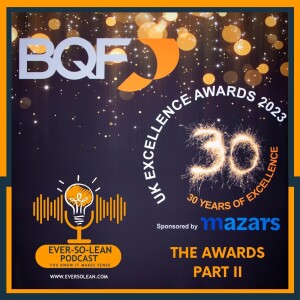
Thursday Nov 09, 2023
Thursday Nov 09, 2023
Get ready for an extraordinary, bumper special episode of the Ever-So-Lean Podcast!
In this episode (Part II), Matt takes you on a thrilling journey back to the unforgettable night of October 5th when the prestigious London Hilton Bankside played host to the UK Excellence Awards 2023. This wasn't just any celebration; it marked a momentous milestone as the British Quality Foundation (BQF) celebrated 30 glorious years as the Home of UK Excellence.
Picture a night brimming with brilliance, dedicated to honouring remarkable achievements and capturing the very essence of excellence. Matt has your backstage pass to relive the electric atmosphere, the jubilant celebrations, and to introduce you to the incredible individuals who made this event truly exceptional. It was an evening where inspiration flowed freely, where exceptional individuals united to share their extraordinary paths to excellence.
The event was nothing short of a triumph, with a record-breaking number of entries and tickets selling out in the blink of an eye. A dedicated panel of 76 experts deliberated on 475 talented individuals from 134 different teams and organisations, making this the grandest BQF awards program to date.
If you're in need of uplifting, feel-good vibes and eager to hear about outstanding work not only in the UK but beyond, you're in the right place. Brace yourself for some live event audio that captures the exuberant atmosphere, making this episode a lively and charming experience like no other.
Visit the BQF to learn more about the wonderful work they do, enquire about becoming a member and enjoy the benefits - https://www.bqf.org.uk/
Find out more about the Ever-So-Lean Podcast at www.eversolean.com
Please don't forget to show your support and help the Ever-So-Lean Podcast thrive by taking a moment to rate and review it, your feedback matters!
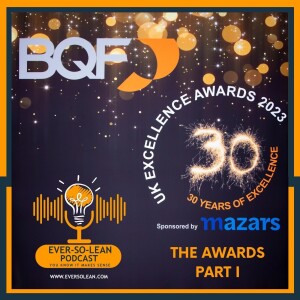
Monday Nov 06, 2023
Monday Nov 06, 2023
Get ready for an extraordinary, bumper special episode of the Ever-So-Lean Podcast!
In this episode (Part I), Matt takes you on a thrilling journey back to the unforgettable night of October 5th when the prestigious London Hilton Bankside played host to the UK Excellence Awards 2023. This wasn't just any celebration; it marked a momentous milestone as the British Quality Foundation (BQF) celebrated 30 glorious years as the Home of UK Excellence.
Picture a night brimming with brilliance, dedicated to honouring remarkable achievements and capturing the very essence of excellence. Matt has your backstage pass to relive the electric atmosphere, the jubilant celebrations, and to introduce you to the incredible individuals who made this event truly exceptional. It was an evening where inspiration flowed freely, where exceptional individuals united to share their extraordinary paths to excellence.
The event was nothing short of a triumph, with a record-breaking number of entries and tickets selling out in the blink of an eye. A dedicated panel of 76 experts deliberated on 475 talented individuals from 134 different teams and organisations, making this the grandest BQF awards program to date.
If you're in need of uplifting, feel-good vibes and eager to hear about outstanding work not only in the UK but beyond, you're in the right place. Brace yourself for some live event audio that captures the exuberant atmosphere, making this episode a lively and charming experience like no other.
Visit the BQF to learn more about the wonderful work they do, enquire about becoming a member and enjoy the benefits - https://www.bqf.org.uk/
Find out more about the Ever-So-Lean Podcast at www.eversolean.com
Please don't forget to show your support and help the Ever-So-Lean Podcast thrive by taking a moment to rate and review it, your feedback matters!
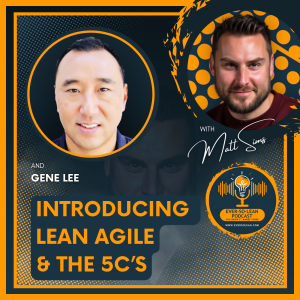
Monday Oct 23, 2023
Monday Oct 23, 2023
Join Matt on this thrilling episode of the Ever-So-Lean Podcast as we embark on an enlightening journey through the transformative realm of Lean Agile, guided by the legendary Gene Lee, the mastermind behind the ground-breaking Lean Agile 5C's Methodology.
In his exclusive conversation, Gene Lee, a true Lean and Agile luminary, reveals the inspiration behind his innovative creation and the key experiences that led to its inception. He explains how the Lean Agile 5C's Model is a fusion of Lean and Agile principles, resulting in a dynamic framework designed to reshape business practices.
Gene walks us through the core principles of the Lean Agile 5C's Model - Customer Centricity, Collaboration, Coordination, Communication, and Continuous Improvement. These five Cs form the bedrock of the framework, driving organisations toward a culture of continuous improvement.
Unravelling the secrets behind the model's success, Gene emphasizes the pivotal role of the Voice of the Customer. He shares real-world examples of how customer feedback has shaped the model's evolution, preventing wasted resources and faulty expansion strategies.
For organisations eager to implement the Lean Agile 5C's Model, Gene provides essential steps and valuable advice for overcoming common challenges during implementation. He highlights the significance of breaking down silos, fostering cross-functional teamwork, and empowering teams through consistent priorities.
The episode also delves into how success and impact are measured in practice, emphasizing everyday metrics that gauge an organization's progress in adopting the framework.
Don't miss this opportunity to learn from a Lean Agile maestro and discover how the Lean Agile 5C's Model is redefining the future of business. Gene Lee's exceptional journey and innovative methodology will leave you inspired and ready to embark on your own path to transformation.
Get ready to be a part of the Lean Agile revolution! Tune in to the Ever-So-Lean Podcast and become a Lean Agile Avenger. Lean back, and let the transformation begin!
Key Takeaways:
1. Lean Agile 5C is a framework that combines Lean, Agile, and other methodologies for continuous improvement.2. The model focuses on five Cs: Customer Centricity, Collaboration, Coordination, Communication, and Continuous Improvement.3. The framework's goal is to foster a culture of continuous improvement within organizations.4. Customer feedback and the Voice of the Customer (VoC) are vital for success.5. The eight common types of waste seen in Lean methods are applicable everywhere.6. Collaboration, coordination, and communication are essential for continuous improvement success.7. Leadership should prioritize consistency in priorities and empower teams.8. Breaking down silos and encouraging cross-functional teamwork is crucial.9. The Lean Agile 5C framework aims to build a culture of continuous improvement, is applicable across industries, and measures success through everyday metrics.10. For more information, visit Gene Lee's websites: a. Lean Agile Mastery: www.leanagilemastery.com b. Radar Consulting: www.radarconsultingllc.com11. Gene’s real-world success stories demonstrate the framework's impact on customer satisfaction and revenue.
To find out more about the certifications available with Catalyst Consulting Ltd, visit www.catalystconsulting.co.uk
Visit the BQF to learn more about the wonderful work they do - https://www.bqf.org.uk/
Enrol in the Online Improvement Kata & Coaching Kata Basics Course. The only Kata training created by Jeffrey K. Liker and Mike Rother! - https://toyota-way-academy.teachable.com/?affcode=43912_2uzhk5-x
Find out more about the Ever-So-Lean Podcast at www.eversolean.com
Please don't forget to show your support and help the Ever-So-Lean Podcast thrive by taking a moment to rate and review it, your feedback matters!

Monday Oct 09, 2023
Monday Oct 09, 2023
Join Matt as he hops into the fast lane as we sit down with the dynamic founder and CEO of SIM Motorsport Ltd, Simon Ricketts, who has been on the exhilarating journey to redefine the SIM racing world with Lean excellence. Simon takes us on a thrilling ride through his career, from diverse adventures in sales, security, hospitality and military service to becoming the driving force behind an electrifying SIM motorsport experience in the UK.
Since taking the helm in October 2021, Simon has catapulted SIM Motorsport to the forefront of the industry, known for its cutting-edge race car simulators featuring the officially licensed 4-point haptic suspension system sanctioned by the prestigious FIA – the most realistic sim experience you'll find.
In this episode, we explore how Lean principles are embedded into the DNA of SIM Motorsport Ltd, from design to operations, with practices like Kanban, Right First Time and benchmarking ensuring every aspect is finely tuned for efficiency. We delve into the role of data analysis and performance metrics, especially in telemetry, and discover the most effective Lean tools like Cause & Effect and Right First Time.
Learn how Simon and his team streamline logistics and event preparation using the Venus Management System, enabling complete remote control and feedback. Explore why professional drivers, racing enthusiasts and corporate parties all flock to SIM Motorsport Ltd for its realistic simulators, telemetry, risk-free experimentation and above all else, realism!
Simon shares his vision for the future of Lean in the SIM racing industry, with plans to expand already racing ahead, his proof of concept ultimately creating a more efficient and enjoyable experience for racers and enthusiasts. So many key learnings to takeaway that are applicable to to your workplace.
Simon's journey and the Lean principles at SIM Motorsport Ltd serve as a shining example of how continuous improvement and data-driven decisions can transform an industry. From 5S practices to daily quality checks, the team at SIM Motorsport embraces precision and customer focus.
Discover how Simon's passion for process mapping has created a world-class experience, and see how data-driven coaching, akin to the Toyota Kata, helps racers improve their performance.
In an ever-evolving world, Simon is excited about the potential of AI technology in motorsport, while valuing the irreplaceable human touch and knowledge.
This episode is packed with valuable insights and lessons that apply not only to motorsport but to any industry. So, buckle up and get ready for an adrenaline-fueled journey of Lean inspiration, benchmarking, and innovation with Simon Ricketts of SIM Motorsport Ltd. If you're seeking a new obsession or simply a good time, make a pit stop at SIM Motorsport Ltd in Gillingham, Kent, UK, and experience the future of racing today!
Explore upcoming events and the RACE SCHOOL program, designed to nurture talented young motorsport enthusiasts. Plus, enjoy exclusive listener perks with a 10% discount (code: EVERSOLEAN8020) and a loyalty scheme.
Key Takeaways:
TQM principles revolve around customer satisfaction, leadership commitment, employee involvement, continuous improvement, data-driven decisions, supplier relationships, structured processes, education, benchmarking, empowerment and prevention. These principles aim to boost quality and organizational excellence. Simon is the prefect example of these skillsets sticking with you and being transferable.
At SIM Motorsport Ltd, Simon and the team have created an environment and an experience that is heavily built on Lean principles, mirroring what you see in Formula One. As soon as you walk through the doors, the environment blows you away. You see practices like 5S, just-in-time, continuous improvement, waste reduction, standardized work, Kanban, visual management, team collaboration and a multi-skilled workforce. Just like racing on track, these principles clearly enhance efficiency and precision in the high-pressure world of SIM Racing.
Before opening SIM Motorsport Ltd, Simon conducted vigorous benchmarking exercises from other industry leading motorsport areas. This enabled him to understand what worked and didn’t work so well. Providing him the blueprint for a world class experience. Right down to the availability of deodorant in the washrooms!
Simon spoke about how he is developing his team in TQM principles naturally. It’s the way they do the work. The learning is being pulled by the team who are keen to learn and drive improvement. The key part here is that it’s a pull system and not a push system. The culture is a culture of continuous improvement. Fantastic.
Every day quality checks take place to ensure that all equipment is in optimal condition. Standard work is in place, including checklists to ensure this happens the same way and at the same time everyday, regardless of who is working. It’s all about precision, customer focus and right first time.
At the end of each day, he does a Gemba meeting with the team to review the day, identify what they could do better and learn from it. Such an important discipline to install and maintain, so simple, yet so powerful.
I loved that Simon shared that he utilises Process Mapping to develop the world class flow and business model he has created to such a high standard. This wasn’t a one off task that filed away somewhere. He frequently goes back to this living breathing document to look for opportunities to improve.
During the SIM experience, the team analyse data captured through telemetry along with the driver to understand where they can improve. The staff are experts (SME’s) and use the data to coach the driver where they can improve. They then go back to the simulator and go again. The process is then rinsed and repeated throughout the session. The key part here for me is using fact and data to ‘coach’ rather than ‘tell’. It’s very similar to the Toyota Kata. It’s about learning a discipline and then practicing it over and over until mastered.
I love that Simon was so open to and excited by the impact AI technology is and will have on his industry. He’s already thinking about the benefits and improvement’s it can add to SIM Motorsport. Yet he is also conscious of where the human touch, interaction and knowledge is valuable in the process.
There was so many learnings today that we can take away and apply to our own working environments. The logic, methods and application approach that Simon has evidenced at SIM Motorsport Ltd is applicable everywhere. If you’re looking for some Lean inspiration, some benchmarking, a good time and potentially a new obsession, get yourself down to SIM Motorsport Ltd in Gillingham, Kent in the UK.
Useful Links:
SIM Motorsport Ltd - https://www.simmotorsport.co.uk/
Use discount code "EVERSOLEAN8020" to receive a 10% discount on your booking
To find out more about the certifications available with Catalyst Consulting Ltd, visit www.catalystconsulting.co.uk
Visit the BQF to learn more about the wonderful work they do.
Enrol in the Online Improvement Kata & Coaching Kata Basics Course. The only Kata training created by Jeffrey K. Liker and Mike Rother!
Find out more about the Ever-So-Lean Podcast at www.eversolean.com
Please don't forget to show your support and help the Ever-So-Lean Podcast thrive by taking a moment to rate and review it, your feedback matters!
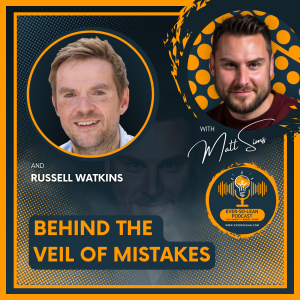
Monday Sep 25, 2023
Monday Sep 25, 2023
🎙️ Get ready to dive into the world of continuous improvement with our special guest, Russell Watkins, the Co-founder of Sempai®! With a diverse background spanning Operations, Materials, and Lean across the Automotive, Aerospace, and Construction Equipment sectors, Russell brings a global perspective to enhancing business performance.
In this exclusive episode of the Ever-So-Lean Podcast, Russell opens the door to his incredible journey, sharing real-life stories of failures that have not only shaped his career but also served as stepping stones to success. 🌟 Join us as we uncover how setbacks can be transformed into invaluable lessons that propel both individual and organizational achievement.
Russell's experiences, from "5S gone wrong" to tackling the world's largest fishbone, reveal the gritty realities of continuous improvement. 🌊 But fear not, for these tales of challenge and triumph are bound to inspire you on your own journey of improvement, innovation, and growth.
Prepare for an insightful conversation that delves deep into the ups and downs of a continuous improvement career. Stay tuned as Russell 'opens the Kimono' and invites you into his world of transformation, problem-solving, and unshakable determination. 🎧📊 Don't miss this opportunity to gain fresh insights and motivation to elevate your own professional and organizational endeavours. Welcome to the Ever-So-Lean Podcast with our special guest, Russell Watkins! 🎉
Key Takeaways:
Russ describes "opening the kimono" as a Japanese term originating from the 1890s, meaning showing a bit of yourself, some humility, a bit of the real you. This practice can help build strong and trusting relationships, creating a comfortable environment between hierarchies in organisations.
If you find yourself at the early stages of your career, there's no need to panic about the next steps. Take your time, try different things, learn, and keep forging your own path. In the end, it will work out.
Factories represent a microclimate where the shop floor is brimming with knowledge, experience, politics, banter, and familial-like units. Taking the time to involve and understand this environment is well worth the investment. Russ's story from Lotus, where he travelled to Belgium and Peru to understand why windscreens were cracking, serves as a prime example of how time, money, and effort can be wasted when direct engagement with operators would have provided the necessary information.
Imposter syndrome often preys on our insecurities. It can lead us to become defensive and reluctant to show vulnerability and humility. We might fear that revealing a lack of understanding, asking questions, making a mistake, or showing a "weakness" will cause others to lose respect for us, judge us, or mock us. However, in reality, very few people will react negatively to this. In fact, evidence suggests that the perception of vulnerability and humility is often viewed more positively by others than those experiencing imposter syndrome might anticipate. Sharing doubts, asking questions, or admitting to a lack of understanding can actually enhance trust and collaboration in professional and personal relationships. This aligns with concepts of psychological safety and a growth mindset.
Coaching and developing others is an incredibly rewarding exercise and a fantastic way to learn and grow as a leader and coach yourself. If you're looking to enhance your coaching skills and have lifetime access to supporting materials, the online Toyota Improvement Kata and Coaching Kata Basics course is an excellent place to start. It's cost-effective and provides a brilliant framework that can be applied in various settings. You can find the link in the description below.
Well-placed and appropriate humour can be a valuable tool for building relationships and fostering understanding. Research supports the idea that using humour appropriately can stimulate positive emotions, improve memory retention, reduce stress, facilitate communication, and create a sense of camaraderie among individuals. It's a powerful tool for making connections and facilitating effective learning and communication.
Russ also spoke about how, as we age, we tend to feel more comfortable and secure about admitting where we could have done things better in the past. The examples Russ provided fall into three categories: 1) the way he leads activities, 2) places where he has failed to practice what he has learned, and 3) in planning Lean transformations where he has made mistakes. This got me thinking about the mistakes I've made during my career. I found it to be a cleansing exercise to reflect on what I've learned over the years. I highly recommend this for you as an individual or even as a group exercise with your team. You don't have to share your reflections, but encouraging the thinking process is a valuable one. Reflecting on past mistakes and areas for improvement in your career is beneficial because it promotes personal and professional growth, enhances self-awareness, improves decision-making, and can be a valuable exercise for teams, fostering a culture of continuous improvement and accountability.
Useful Links:
Sempai - https://www.linkedin.com/in/russellwatkinssempai/
Russel Watkins LinkedIn - https://www.linkedin.com/in/russellwatkinssempai/
Sempai YouTube Channel - https://www.youtube.com/@the_lean_expert
To find out more about the certifications available with Catalyst Consulting Ltd, visit www.catalystconsulting.co.uk
Visit the BQF to learn more about the wonderful work they do.
Enrol in the Online Improvement Kata & Coaching Kata Basics Course. The only Kata training created by Jeffrey K. Liker and Mike Rother!
Find out more about the Ever-So-Lean Podcast at www.eversolean.com
Please don't forget to show your support and help the Ever-So-Lean Podcast thrive by taking a moment to rate and review it, your feedback matters!
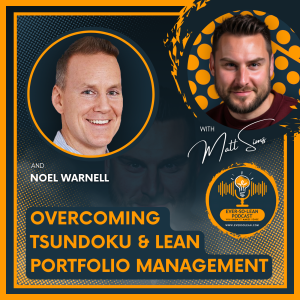
Monday Sep 11, 2023
Monday Sep 11, 2023
Get ready for a rip-roaring episode of the Ever-So-Lean Podcast! 🎙️
Join us as we embark on an eye-opening journey with the one and only Noel Warnell. With over two decades of software expertise and a passion for devouring books and Agile expertise, Noel is about to drop some serious wisdom that will leave you craving more.
In this episode, you'll discover:
📚 Revolutionise Your Reading Habits: Noel reveals his secrets for making the most out of your reading time. Learn how to cut through the noise, identify the most valuable sections, and establish a daily reading habit that fits your busy life.
🚀 The Power of Lean Portfolio Management (LPM): Dive deep into the world of LPM, a game-changer for large organisations. Discover how breaking projects into smaller, testable segments can skyrocket your efficiency and agility, all while reducing risk.
🌟 Continuous Improvement Unveiled: Noel identifies how without knowing it we are all embracing a Lean mindset in our daily life.
Prepare to be inspired, informed, and utterly entertained as Noel guides you through the world of Agility, Transformation and getting on top of your backlog of books! This episode is your golden ticket to becoming a more agile, innovative, and book-loving version of yourself! 🔥 Don't miss out – your journey to a brighter, leaner future begins here. 🚀📖
Key Takeaways:
**Adapt Your Reading Habits:** Reading cover to cover is something we learnt at a round age, but may not be necessary as an adult. Identify the sections that are relevant to you and establish a regular reading habit, even if it's just 5 minutes a day.
**Don't Force Yourself:** Don't hesitate to put down a book if it doesn't resonate with you. Just as you would walk away from a movie or conversation, it's okay to ditch a book that isn't connecting with you. You won’t hurt its feelings.
**Books on a Budget:** You don't need to be wealthy to read. You can access books from libraries, charity shops, through neighbourly generosity, even from some cafes and old telephone boxes.
**Rethink Note-Taking:** Consider alternative methods like sketch noting and mind mapping to retain information effectively, rather than relying solely on traditional note-taking of it doesn’t work for you. It is scientifically proven that we retain more information when it’s visual. Be creative.
**Continuous Improvement:** Embrace a lean and continuously improving mindset in your daily life. It's a natural part of human evolution. You’d be shocked to realise how many of your daily activities are performed in a lean way without you even realising it. Think about it.
**Internal Culture Transformation:** If you want lasting change and a desired culture in your organization, it must come from within rather than relying solely on external experts or consultants. The best way to utilise a consultant is to use their knowledge and experience to develop your own organisation. Let them support you.
**Lean Portfolio Management (LPM):** LPM is a valuable approach for budgeting and resourcing projects. It encourages breaking projects into smaller segments, enabling testing and flexibility, and reducing risk. It Considers shorter-term (3-6 months) planning with reduced investments to increase agility and reduce risk in project management.
**Engage Stakeholders:** Involve senior stakeholders and create a framework for LPM. Keep it simple and ensure the right people are on board. It’s a complete change of mindset and approach from tradition.
These takeaways emphasize the importance of adaptability, efficiency, and a holistic approach to personal and organizational development.
Useful links that Noel referenced:
https://www.noelwarnell.uk/post/8-super-simple-ways-to-read-a-metric-crap-ton-of-books-in-2023
https://www.noelwarnell.uk/product-page/agile-bullshit-cards
https://www.thegreatbritishbookshop.co.uk/products/the-quarterly-agile-planning-journal?_pos=1&_sid=fd6f96a0e&_ss=r
https://www.linkedin.com/in/noelwarnell
To find out more about the certifications available with Catalyst Consulting Ltd, visit www.catalystconsulting.co.uk
Visit the BQF to learn more about the wonderful work they do.
Enrol in the Online Improvement Kata & Coaching Kata Basics Course. The only Kata training created by Jeffrey K. Liker and Mike Rother!
Find out more about the Ever-So-Lean Podcast at www.eversolean.com
Please don't forget to show your support and help the Ever-So-Lean Podcast thrive by taking a moment to rate and review it, your feedback matters!
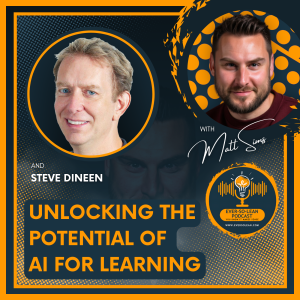
Wednesday Aug 23, 2023
Wednesday Aug 23, 2023
Welcome to another exhilarating episode of the "Ever So Lean" podcast! Today, we have the privilege of hosting a true visionary in enterprise learning and development, Steve Dineen. He is the trailblazing founder of Fuse, a ground-breaking enterprise learning and knowledge platform that has transformed the way people engage with learning experiences.
In this electrifying conversation, we take a journey through Steve's remarkable career, from scaling and selling the UK's second-largest bespoke digital learning company to his inspiring initiative, Fuse School. Through Fuse School, Steve has democratized education by offering GCSE-grade education to millions worldwide, completely free!
Steve's passion for leveraging cutting-edge technology, particularly AI, to reshape education shines brightly. We explore his insights into AI's imminent role in education and its incredible potential to revolutionize traditional learning landscapes. As the episode unfolds, we dive deep into how Fuse harnesses AI to create personalized, adaptive, and enriching learning experiences.
We uncover the delicate balance between AI-driven automation and the irreplaceable human touch in learning. While the future is promising, challenges loom—Steve delves into the considerations surrounding evolving AI technology, data privacy, and ethical concerns.
🌟 But that's not all! 🌟
Get ready for some lightning-round excitement as Steve takes on the "Yes, No" challenge. Can he conquer the rapid-fire questions without uttering a "Yes" or "No"?
With the closing notes, we extend our heartfelt gratitude to Steve Dineen for sharing his insights and transformative journey with us. If you've enjoyed this captivating episode, remember to subscribe and follow the "Ever So Lean" podcast at eversolean.com. Your reviews mean the world to me, so take a moment to like and review us on your preferred platform.
Key Takeaways:
Steve challenges the conventional approach to learning by advocating for personalized learning experiences that AI can provide. He believes that educators often design learning based on their own preferences rather than adapting to individual needs. Steve’s perspective contrasts with traditional methods that involve passive learning, where information is presented and then expected to be retained and applied. An approach that rarely achieves the desired output. We’ve all experienced it, ask yourself “do I enjoy that”. “Did I retain the knowledge”?
Steve shared intriguing examples of harnessing collective intelligence within his team and enhancing it using AI technology. One fascinating use case involved incorporating the voice of “celebrities” to make the content more engaging.
Addressing concerns about AI and job displacement, Steve offered a thought-provoking insight: “it’s not AI that is going to take your job, it’s someone using AI that will take your job.” He draws parallels to the transition from landlines to mobile phones, suggesting that embracing AI is crucial for professional growth.
Steve emphasised that AI is a powerful tool for improvement across various aspects of the workplace. He mentioned that AI enhances his products and services, accelerates his educational mission through the Fuse School, and streamlines internal processes such as data analysis for sales and marketing trends.
Steve identifies three key areas where AI accelerates learning: breaking down language barriers, facilitating quick access to relevant information, and enabling hyper-personalization. He envisions a learning model where AI provides foundational knowledge and continuously feeds relevant content to learners, ensuring better retention and application.
Steve categorizes AI’s role into seven main buckets:
Removing Language Barriers: AI eliminates language obstacles and enables instant localization of content.
Quick Answers: AI assists in finding everyday solutions to job-related queries.
Content Creation: AI aids in generating relevant and engaging content.
Recommendations: AI offers personalized recommendations for career development and growth.
Teaching/Coaching: AI serves as a teacher or coach, tailoring content to improve engagement and retention.
Task Automation: AI automates tasks, simplifying processes and boosting productivity.
Data Interpretation: AI analyses complex data, empowering decision-making without requiring specialized expertise.
Steve’s insights emphasize the transformative potential of AI in learning and beyond. He envisions a future where AI-driven personalization and efficiency redefine how we learn, work, and make informed decisions. Like it, love it, or fear it, AI is here and it’s changing the world as we know it. It’s part of our lives and will part of our children’s lives and our grandchildren’s lives and so on. The pace of development is lightning fast, the potential unimaginable. In the business and learning worlds it’s opening up new opportunity almost weekly. Exciting times!
Learn more about the work Steve does at FUSE Universal and FUSE School
To find out more about the certifications available with Catalyst Consulting Ltd, visit www.catalystconsulting.co.uk
Visit the BQF to learn more about the wonderful work they do.
Enrol in the Online Improvement Kata & Coaching Kata Basics Course. The only Kata training created by Jeffrey K. Liker and Mike Rother!
Find out more about the Ever-So-Lean Podcast at www.eversolean.com
Please don't forget to show your support and help the Ever-So-Lean Podcast thrive by taking a moment to rate and review it, your feedback matters!
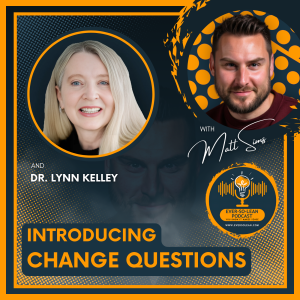
Sunday Aug 13, 2023
Sunday Aug 13, 2023
Today we meet Dr. Lynn Kelley, an esteemed professional whose illustrious career spans leadership roles in engineering, supply chain management, and continuous improvement across diverse global industries. Notably, she retired as the Senior Vice President of Supply Chain and Continuous Improvement at Union Pacific Railroad, and now serves as a Senior Advisor to BBH Capital Partners, guiding their investment endeavours.
Prior to her tenure at Union Pacific, Lynn held influential positions, including Vice President of Operational Excellence at Textron, where she earned a seat at the executive leadership table. Additionally, she was the visionary force behind Union Pacific's innovation program, driving transformative thinking within the organization.
Lynn's academic brilliance shines through her teaching experience in undergraduate and graduate statistics courses, bolstered by her PhD in evaluation and research. Before venturing into academia, she excelled in executive roles, such as the Executive Vice President and Chief Operating Officer of Doctors Hospital in Detroit.
Throughout her extraordinary career, Lynn has been a masterful guide in Change Management initiatives. But beyond her executive accomplishments, Lynn captivates audiences as a seasoned keynote speaker and esteemed author. Her latest book, "Change Questions," was co-authored with John Shook. In this episode, we have the privilege of hearing all about this game-changing book, accompanied by a downloadable Digital Workbook that empowers readers to embark on transformative Change Management activities.
With her wealth of experience and innovative strategies, Dr. Lynn Kelley continues to inspire and empower individuals and organizations alike, solidifying her position as an influential figure in the world of Change Management. This episode promises to provide deep insights into Lynn's remarkable journey and her ground-breaking book, "Change Questions."
Key Takeaways:
1. Research varies but it’s a safe bet that the probability of the implementation of change being a success is 30-40%. The entire purpose of the change questions book is about increasing that probability.
2. The Change Questions book aims to increase the probability of successful change implementation based on a Union Pacific case study. It offers 11 flexible questions to consider before implementing change, with the goal of achieving sustained success defined as 6 consecutive months of meeting or surpassing the point of implementation within a 12-month period.
3. The book encourages a fluid approach, allowing readers to choose relevant ideas and take ownership of the change process. To support implementation, a digital workbook is available for free on www.changequestions.net, providing additional information.
4. Lynn emphasised the value of learning from failure. Planning for failure with mitigating actions and encouraging adapting and overcoming challenges to make progress is worth its weight in gold. Data-driven decision-making and a focus on language that fosters ownership are highlighted throughout Lynn’s words today.
5. Language use is so powerful. Process owners are replaced by ‘Sustainers’ who are mentored and coached during implementation. As change continues to post-implementation, mentors’ step back, and project closure becomes ‘Project Transition’. If issues arise, mentors return to offer support.
6. The Change Questions book target audience includes board members, CEOs, change agents, individuals involved in change initiatives, and students. The approach blends elements of the change curve, emphasizing the importance of engaging middle-of-the-road or neutral groups to ensure success.
7. The selection of pilot sites is based on change agents rather than location, ensuring ample support and publicity for successful transitions. Lynn’s example involves seeking volunteers through a call to arms, empowering individuals to make their own choices. Rather than change being imposed upon them.
8. Change is acknowledged to take time to embed, and continuous improvement initiatives may require patience, but the rewards are well worth the effort. The book advocates a long-term perspective, emphasizing the correlation between continuous improvement and performance.
Learn more about Dr. Lynn Kelley via her LinkedIn profile at https://www.linkedin.com/in/lynnkelleychange/
You can order a copy of 'Change Questions' on Amazon - https://amzn.to/46JmQDc
Or download the accompanying 'Digital Workbook' at https://www.changequestions.net/
To find out more about the certifications available with Catalyst Consulting Ltd, visit www.catalystconsulting.co.uk
Visit the BQF to learn more about the wonderful work they do.
Enrol in the Online Improvement Kata & Coaching Kata Basics Course. The only Kata training created by Jeffrey K. Liker and Mike Rother!
Find out more about the Ever-So-Lean Podcast at www.eversolean.com
Please don't forget to show your support and help the Ever-So-Lean Podcast thrive by taking a moment to rate and review it, your feedback matters!
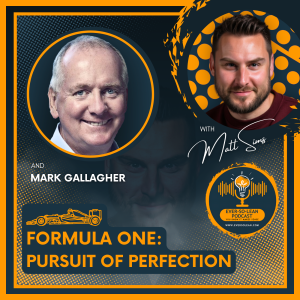
Monday Jul 31, 2023
Monday Jul 31, 2023
Welcome to the Ever-So-Lean Podcast, where in this episode we embark on an exhilarating journey into the world of Formula One, a sport that thrives on continuous improvement and Lean principles. In this high-speed environment, competition and regulations are at an all-time high, making efficiency paramount. Formula One teams operate under cost capping measures and by embracing Lean principles, they optimize operations, streamline processes, and allocate resources wisely, leaving no room for waste. Every action is focused on maximizing performance, making even the smallest enhancement count.
The agility and adaptability demanded by this sport are nothing short of crucial. With the landscape constantly evolving, Lean principles equip teams to respond quickly to changing circumstances, whether it's adjusting strategies during a race or adapting to new regulations. By integrating Lean into their DNA, teams maintain a competitive edge and stay ahead of the game.
Safety and reliability are non-negotiable in Formula One, and here too, Lean plays a vital role. Proactive risk management ensures the well-being of drivers and crew members, while error prevention techniques enhance overall reliability and performance. Lean methodologies provide the framework for a robust safety culture that keeps everyone involved protected.
At the heart of Formula One lies innovation and technological advancements. Lean fosters a culture of innovation by encouraging teams to push boundaries, explore new ideas, and leverage cutting-edge technologies. It's a breeding ground for ground-breaking developments that shape the future of the sport.
In this fast-paced world, teamwork is the bedrock of success, and Lean principles enhance collaboration and communication. The seamless coordination of the pit crew during a high-pressure pitstop exemplifies the power of Lean teamwork. Every member understands their role, communicates effectively, and trusts their teammates, leading to lightning-fast pitstops that can make all the difference in a race.
Our guest today, Mark Gallagher, is a legendary figure in Formula One with over three decades of experience. He has held senior roles in prestigious teams, shaped the regulatory environment, and been at the forefront of technological advancements. As an author, his insightful books provide valuable perspectives on the sport and its management. Through his media work, public speaking engagements, and industry analysis, Mark continues to shape the landscape of Formula One, further solidifying his status as a respected industry analyst and sought-after speaker. With Mark's guidance, we will learn valuable lessons from this pulse racing sport, that you can apply in your organisation.
Key Takeaways:
CI in Formula One is commonly an organic way of working. Most engineers do not have a physical education in Lean or alike. It’s ingrained in the way they work. It’s the way they do things.
All the teams work in a similar way, from the top performing to the least competitive. It’s the way things are done.
Agility is critical, it allows empowerment and speeds up decision making. Heavily based on data. Learning from failure.
Define the value of what you want to achieve. What does the customer need? Benchmarking against the competition is an important aspect to help drive innovation and improve performance. There no room to hide, results are published publicly.
The overall objective is to win the race. But even after facing obstacles, the path to the target condition is adapted and broken down into bite sized, measurable milestones that are all driven by data led decisions.
Obstacles are not taken as a negative. They are flipped into an opportunity to gather data and learn. Better equipping the team for the future. This is a remarkable process and minds set, and can easily be transfer into everyday operations in your organisation.
Curiously to continuously improve drive innovation and upgrades. Mark painted us a great picture of an environment where even when things are going well, and races are being won. Formula One teams do not sit still. They are continuously using data to evaluate performance in every area. Persistently looking for opportunities to improve. This inference comes incrementally through updates to the car. But it never stops, the hunger, the drive and curiosity to reach perfection.
Formula One is a process driven industry. To enable such high levels of performance, and extraordinary curiosity to continuously improve. Process and mechanisms are the critical vessel to enable this to happen. Without this, the ability to develop at such a pace, improve and go again just wouldn’t be possible.
They are not only monitoring data and studying their own performance. They are constantly monitoring what the opposition team are doing. What upgrades have they made. What impact has it made? Always looking for learnings that help drive performance improvement.
Formula One has embraced analytics to enable them to manage risk, improve safety and performance.
Ownership across each and every single person is remarkable! Everyone knows their role, how it contributes to the overall objective and as a collective, without exception everyone is working towards that North Star. This isn’t by luck. These are well trained people, supported with engrained standard work and mechanisms which are the framework for innovation and ultimate success.
The halo is a fantastic example of a focus on risk management to improve safety (the halo is a safety device introduced to protect the drivers’ heads from potential impacts). Developed based on data, and the results speak for themselves.
AI and simulation play a massive part in modern F1. Teams have dedicated drivers to Simulator racing. Dedicated to using a virtual world to test new developments. Increasing the pace of design to conception. Reducing costs of manufacturing potential upgrades that fail. Simulating race scenarios thousands of times l, data which is used to develop race strategies. A fabulous example of the modern world blending seamlessly with human beings to do things better.
Learn more about the work Mark does, and enquire about keynote opportunities from an inspiring line-up at https://performanceinsights.co.uk/
You can order a copy of Mark's latest book 'The Future Business Formula' on Amazon via https://amzn.to/3YFkpzy
Want to experience a serious SIM racing experience? Check out SIM Motorsport - Awesome!
To find out more about the certifications available with Catalyst Consulting Ltd, visit www.catalystconsulting.co.uk
Visit the BQF to learn more about the wonderful work they do.
Enrol in the Online Improvement Kata & Coaching Kata Basics Course. The only Kata training created by Jeffrey K. Liker and Mike Rother!
Find out more about the Ever-So-Lean Podcast at www.eversolean.com
Please don't forget to show your support and help the Ever-So-Lean Podcast thrive by taking a moment to rate and review it, your feedback matters!
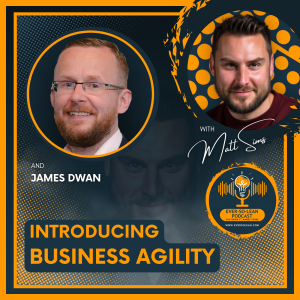
Monday Jul 17, 2023
Monday Jul 17, 2023
In this episode we're onto Business Agility and its transformative power in organisations. Join Matt and special guest, James Dwan, the CEO of Catalyst Consulting. James is a seasoned expert in Business Transformation, well-versed in Agile frameworks, Systems Thinking, Strategy Deployment, Digital transformation) and Lean Six Sigma.
Throughout his career, James has successfully implemented innovative business transformations, combining the power of Lean and Agile methodologies, earning praise from esteemed clients such as The London Stock Exchange, UKRI, Elavon, and Essex County Council. With his wealth of experience, James shares his valuable insights on Agile techniques, shedding light on the benefits and practical applications of Business Agility at both the team and organisational level.
Agile, a new contender in the world of Continuous Improvement methodologies, is making waves beyond its origins in the software industry. Just as Lean transcended automotive and factory settings, Agile is now taking the world by storm. What sets Agile apart is its iterative and collaborative problem-solving approach, breaking down complex adaptive problems into smaller increments and fostering continuous learning and adaptation through rapid feedback. Elements that in this episode James helps us to really understand.
While commonly associated with software development, Agile's versatility extends far beyond that domain. Agile approaches like Scrum or Kanban can effectively manage and track improvement projects in various business initiatives. Today, we dive deep into the realm of Agility, exploring its origins, unique characteristics, advantages, disadvantages, and practical uses.
By delving into the foundations of Agile and understanding its distinguishing features, this episode aims to equip you with an entry-level understanding of the value Business Agility can bring to your organisation. James's expertise will provide valuable insights and first hand experiences, allowing you to grasp the benefits of Agility and how it can be effectively applied in your own workplace.
Key Takeaways:
It’s about making it enjoyable. Creating an environment where people are empowered to make change and challenge the status quo. Creating passion for change within your organisation. Creating that joy of discovery just can’t be bought. It’s imperative to a healthly organisation.
Agile is about getting value to a customer. Its framework is a set of values, principles, and practices that guide the implementation of Agile frameworks like Scrum and Kanban. It emphasizes cross-functional teams, iterative development, and continuous improvement. Key components include a product backlog, fixed-time sprints/iterations, daily stand-up meetings, sprint review and retrospective sessions, and a focus on delivering value and adapting to change. Agile fosters collaboration, customer involvement, and flexibility in software development and project management processes.
Agile gets into the physiology of human beings. James introduced us to HPPOs (Highest Paid Persons Opinion). Although the term may be new, you may recognise the behaviours of a HPPO culture. Basically do as you are told. In an agile culture, you are aloud to be wrong, in fact you might say it’s encouraged. It’s about learning fast, asking questions like what is the earliest we can run an experiment to check if customers would like that information r care about it? Creating an environment of physiological safety is an absolute must.
Pivot from bad to good ideas. Run experiments, if it doesn’t work and is going in the wrong direction, stop and try something else. James shared a great idea where bad ideas being laid to rest are celebrated in a ‘funeral party’. Such a great idea! Let’s prove it’s a bad idea before we progress. If we can’t prove it’s a bad idea then we know that we have a good bet that we should progress and explore further.
Getting the right leadership behaviours are a tiger in the tank. Meaning that these behaviours will have the effect of a strong, energetic presence that can give your organisation a competitive edge. Get these right and good things will follow. People are going to learn new skills, it’s takes time to establish a culture of business agility. But the outputs of getting this right is positive in so many ways, in all industries. Agile is a play to win way of thinking. It’s about using feedback, learning and adapting. It enables organizations to become more adaptable, innovative, customer-focused, collaborative, and continuously improving, thereby increasing your chances of long-term success in a rapidly changing business landscape.
What is Scrum? It’s a common question. James described it well when he said It’s a flavour of Agile ways of working. Scrum is just one example of an Agile framework for managing complex projects and product development. It involves three roles: Product Owner, Scrum Master, and Development Team. Projects are divided into fixed-duration sprints, typically two to four weeks long. The Product Backlog prioritizes the work to be done, and the team selects items for each sprint during the sprint planning meeting. Daily Scrum meetings synchronize the team's work, while the sprint review showcases completed work to stakeholders. The sprint retrospective allows the team to reflect on the process and identify improvements. Scrum promotes collaboration, adaptability, and continuous improvement in delivering value incrementally.
When it comes to Agility, the Cynefin framework can be used to guide decision-making and adaptability. Agile organizations often leverage the framework to identify which context a problem or situation falls into and determine the most suitable approach. Agile practices, such as iterative development, feedback loops, and continuous learning, align well with the complex and chaotic contexts of the Cynefin framework. By embracing agility, organizations can respond effectively to complex and uncertain situations, experiment with different approaches, and adapt their strategies based on feedback and learning. (Link in show notes)Celebrate learning. It’s not a personal journey, it’s an organisational journey. Target destination is organisational agility.
Try to avoid creating new Metrics to measure agile transformation impact. Use your standard organisation metrics and thought human behaviour. The two go hand in hand. The two drive sustained culture.
To find out more about the certifications available with Catalyst Consulting Ltd, visit www.catalystconsulting.co.uk
The three that James referred to specifically today were:
Agile Fundamentals - www.catalystconsulting.co.uk/icagile-agile-fundamentals/
Business Agility - www.catalystconsulting.co.uk/icagile-business-agility-foundations/
Business Black Belt Programme - www.lean-six-sigma.training/business-black-belt
Additional Reading:
The Cynefin Framework - www.thecynefin.co/about-us/about-cynefin-framework/
The New New Product Development Game - www.hbr.org/1986/01/the-new-new-product-development-game
Enrol in the Online Improvement Kata & Coaching Kata Basics Course. The only Kata training created by Jeffrey K. Liker and Mike Rother!
Find out more about the Ever-So-Lean Podcast at www.eversolean.com
Please don't forget to show your support and help the Ever-So-Lean Podcast thrive by taking a moment to rate and review it, your feedback matters!










